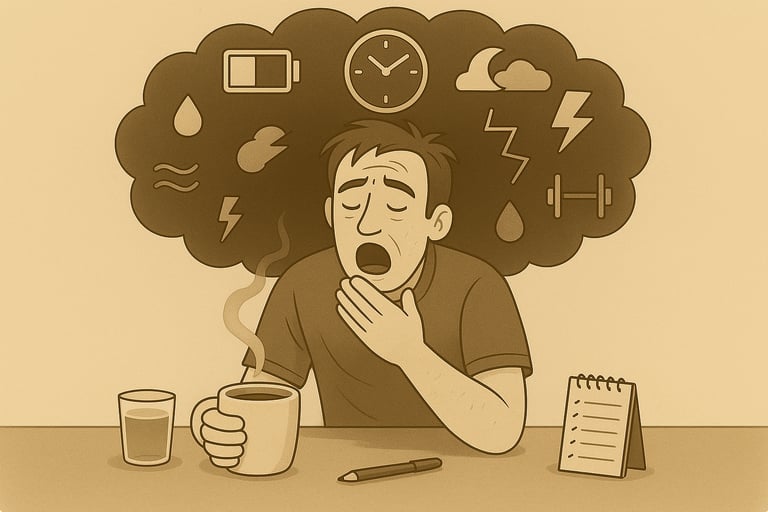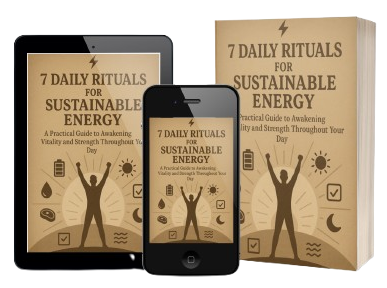⚡ Energy Reset Plan
Reclaim your body's power. Take back control of your day.


Arrives in your inbox in under a minute. Zero spam.
Recognize these moments?
Morning starts with the snooze button. Again. And again. You're losing the battle with your alarm before the day even begins. Coffee has become an obligation, not a pleasure. Without it, you simply don't function.
Around 2 PM, that heavy drowsiness hits. Your head drops toward the keyboard, eyes closing on their own. Coworkers notice you're “not yourself” in the afternoon. Meetings become torture.
Weekends, instead of enjoying your free time, you just lie on the couch. Your partner asks, “Want to go somewhere?” You don't even have the energy to think about an answer. The kids want to play, but you can barely keep your eyes open.
Evenings are the worst. You're exhausted, but when you lie down, sleep won't come. Your brain switches on right when it should switch off. Tomorrow will be the same day, only harder.
Even when you try to exercise, your body won't cooperate. You used to run 3 miles without breaking a sweat. Now you're winded after one flight of stairs.
What's actually happening in your body?
Your body is an incredible energy factory. In every cell, you have tiny power plants called mitochondria. They convert food and oxygen into ATP, the molecule that literally fuels every thought, movement, and heartbeat.
But here's what happens when you live the modern life: stress shuts down these little power plants. Lack of sleep damages them. Processed food doesn't give them the right raw materials. Constant sitting slows their production. Blue light from screens sends them the wrong signals.
Imagine trying to drive a car with water instead of gas, with flat tires and dirty filters. The car might start, but it won't get far. That's how you feel, like you're pushing yourself through the day instead of being carried by energy.
Your nervous system is stuck in constant alert mode. The sympathetic nervous system (fight or flight) runs non stop, while the parasympathetic (rest and digest) barely engages. It's like having your foot on the gas and brake at the same time. The engine overheats while you go nowhere.
Your hormones are in chaos. Cortisol that should wake you in the morning peaks at night. Melatonin that should help you sleep barely gets produced. Insulin spikes up and down from quick snacks. Your thyroid slows down because it thinks you're in danger.
Three traps we all fall into
1. More coffee = more energy
Morning cup. Then another after breakfast. Third one after lunch. Maybe an energy drink in the afternoon. Sound familiar? Caffeine doesn't give you energy, it just blocks your tiredness receptors. It's like turning off the fire alarm instead of putting out the fire.
The problem? The more caffeine you consume, the more you need for the same effect. And when it wears off, the crash gets deeper. Your body produces even more adenosine, the tiredness molecule, to compensate. Vicious cycle.
2. Resting with screens
You finish your workday in front of a computer. How do you unwind? Watch a show. Scroll through social media. Play games on your phone. “I'm resting my brain,” you think.
But your brain doesn't distinguish between a work screen and a Netflix screen. To your brain, it's the same thing: constant stimulation, blue light, rapid image changes. Your nervous system stays in alert mode. That's not rest, it's just changing the channel on exhaustion.
3. “I'll catch up on sleep this weekend”
During the week you sleep 5 to 6 hours. “No big deal,” you think, “I'll sleep until noon on the weekend.” But sleep doesn't work like a savings account. You can't bank missed hours.
Every night of poor sleep leaves a mark. Hormones get disrupted. Inflammation rises. Mitochondria get damaged. Weekend sleep ins just further shift your circadian rhythm. Monday becomes even harder.
🔄 Energy Reset Plan: 3 steps that change everything
Step 1: Morning body awakening (before the mind)
What to do: The moment you open your eyes, don't reach for your phone. Get up, open a window or step outside. Look at the sky for 2 to 3 minutes, even if it's cloudy. Light signals your brain: “Day has begun, produce cortisol!”
Then, 5 minutes of gentle movement. Not exercise, just movement. Stretch like a cat. Do 10 squats. Walk around your home. Activate your body before your mind.
Only then coffee. But with intention. Not automatically, but consciously. Enjoy it. And limit yourself to 2 cups before noon.
Why it works: Morning light sets your circadian clock for the entire day. Movement activates mitochondria and starts the lymphatic system. Delayed coffee allows natural cortisol to wake you, so caffeine has a stronger effect.
Step 2: The 3-3-3 Method for stable energy
Every 3 hours throughout the day:
• Protein: Eat something with protein, an egg, Greek yogurt, almonds, a piece of cheese. Protein stabilizes blood sugar and provides building blocks for neurotransmitters.
• Water: Drink a glass of water. Just 2% dehydration reduces cognitive abilities by 20%. Your brain is 75% water, give it fuel.
• Pause: 3 minutes without screens. Close your eyes. Breathe deeply, 4 seconds in and 6 seconds out. Or just look out the window. Reset your nervous system.
Sample schedule:
7:00 AM: protein breakfast, water, breathing
10:00 AM: nuts, water, walk to the kitchen
1:00 PM: protein rich lunch, water, gazing out the window
4:00 PM: yogurt or hummus, water, stretching
7:00 PM: dinner, water, calm music
Step 3: Evening protection for tomorrow's energy
Sixty minutes before bed: Turn off all screens. No exceptions. Phone in another room. TV off. Laptop closed.
What to do instead:
• Dim, warm lighting (candles are ideal)
• Light book (not business literature)
• Journaling: write 3 good things from your day
• Gentle stretching or yoga
• Conversation with family
• Preparing tomorrow's outfit
Bedroom: Cool, 64 to 66°F. Dark, replace LED clocks. Quiet. Bed is only for sleep, not for phones, not for laptops, not for worry.
Why this is crucial: Evening determines your sleep quality, and sleep determines tomorrow's energy. This ritual signals your body, “It's safe to relax.”
How it feels when your energy returns
Week 1: The afternoon crash isn't as dramatic. Instead of falling into a coma after lunch, you feel mild drowsiness that passes quickly. Digestion works better, no bloating or heaviness. First evenings without screens feel weird, but you fall asleep faster.
Week 2: You wake before your alarm. Not perfectly rested, but more ready than before. Morning routine becomes automatic. Colleagues notice you're “brighter.” Your partner comments that you're “present.” Kids get a parent who has patience.
Week 3: Focus lasts longer. You can work 2 hours without checking your phone. Physical activity isn't torture, your body craves movement. Afternoons, you have energy for hobbies. Sleep quality has drastically improved.
After one month: Your body and mind work in tandem. You have energy to follow through on your ideas. Weekends aren't for recovery, but for enjoyment. Stress is still there, but it doesn't drain you. You've become someone who “has energy for everything.”
No, you haven't become superhuman. You've just stopped sabotaging your natural energy.
🎁 Free eBook: “7 Daily Rituals for Sustainable Energy”
Why another energy guide? Because this one doesn't ask you to change your entire life. You don't have to wake at 5 AM. You don't have to meditate for an hour. You don't have to go vegan.
These 7 rituals are designed for people living in the real world, with jobs, obligations, stress.
Each ritual takes less than 10 minutes. Each is science based. Each delivers measurable results.
What you'll find inside:
Morning Cortisol Reset: How to wake your body before your mind and avoid morning fog
Micro food for Micro energy: Which nutrients directly feed your mitochondria
Walking Without Purpose (But With Intention): Why 10 minutes of walking gives more energy than an energy drink
Brain Refreshing Breathwork: The 4 7 8 technique that resets your nervous system in 90 seconds
Screen Diet for Your Nervous System: How to use technology without it draining you
Energy from Gratitude: The neurobiology of positive emotions and how they affect ATP
Weekly Energy Review: A 5 minute evaluation that maintains your energy long term
Each ritual comes with: scientific explanation (why it works), step by step instructions, common mistakes, and real life examples.
You do not have to accept exhaustion as normal. You do not have to live on caffeine and willpower. Your body knows how to produce energy. Your job is to stop getting in its way.
The Energy Reset Plan is not another to do list. It is a simple system that helps your natural vitality come back online.
Access after email confirmation. No spam. Unsubscribe anytime.


Reclaim your energy. It starts today.
info@naturalmindedge.com
© 2025. All rights reserved Natural Mind Edge.
